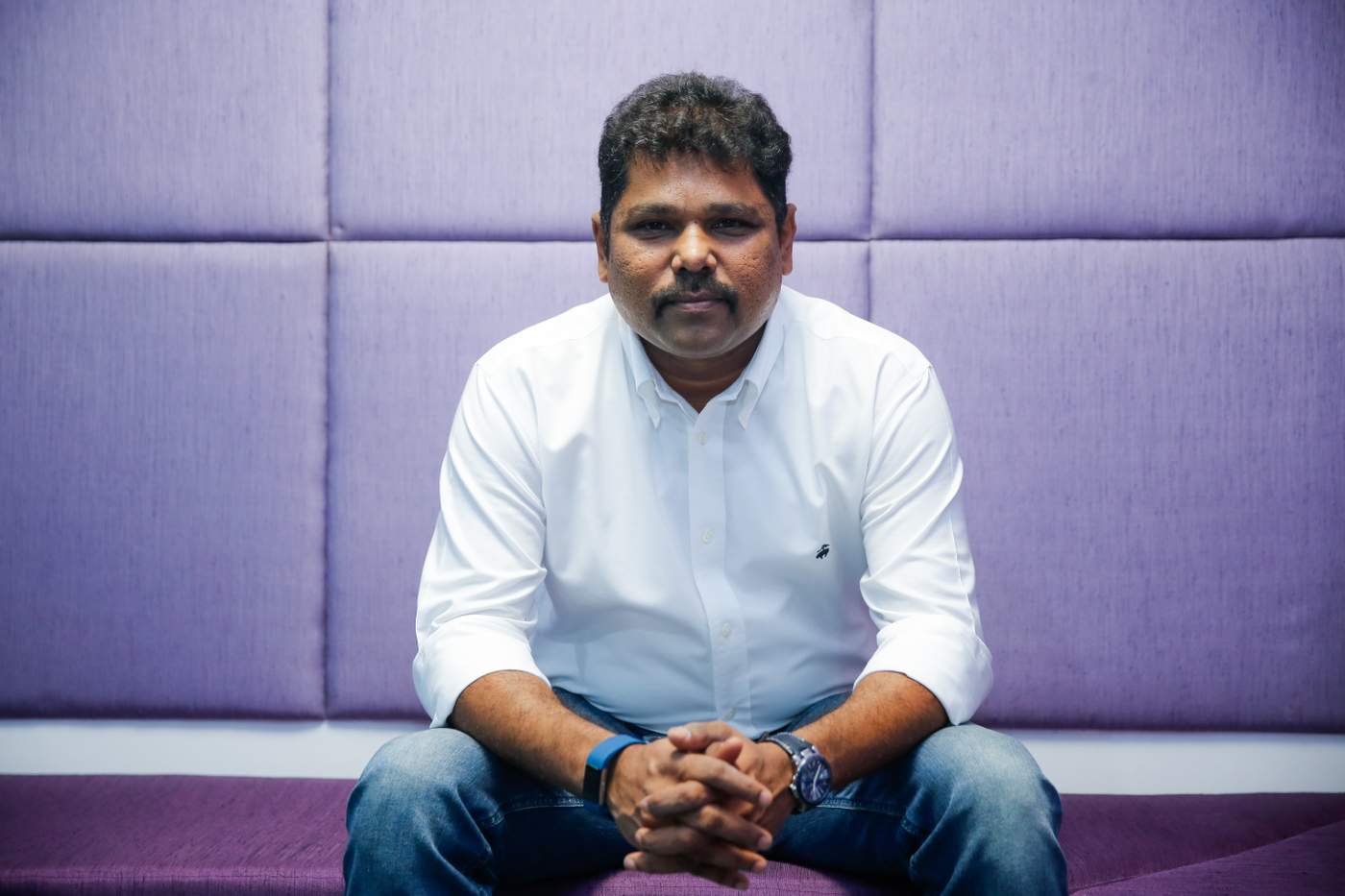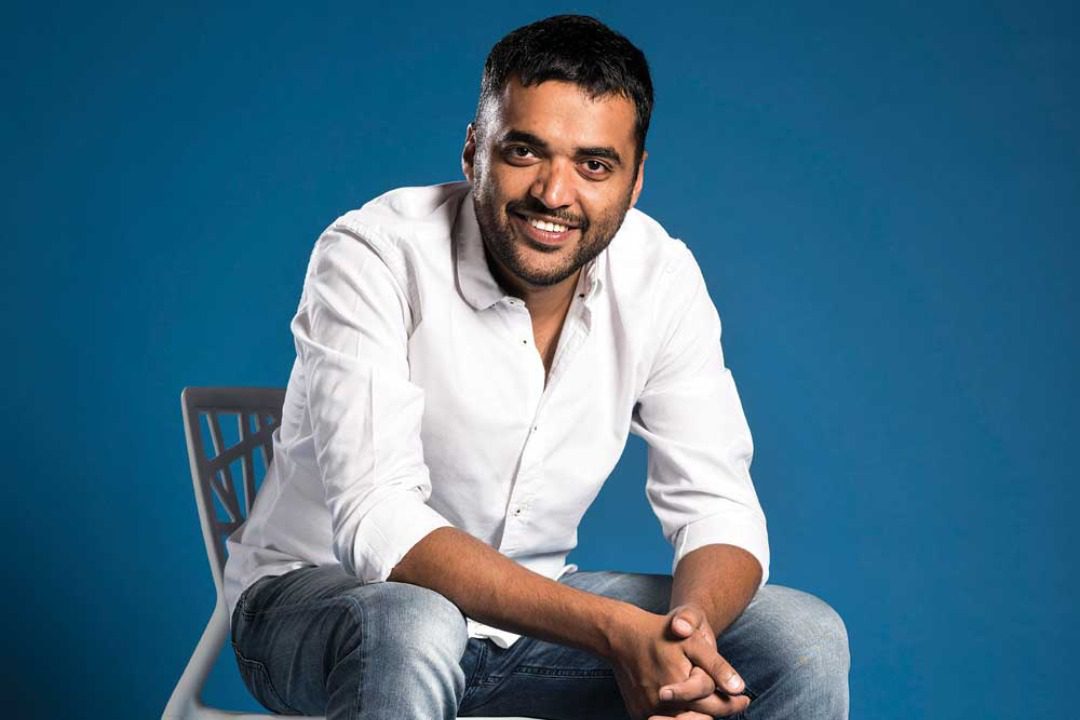(September 24, 2021) On September 22, 2021, an Indian startup created history when it became the first-ever software maker from the subcontinent to list on the NASDAQ. The Indian startup ecosystem erupted in joy as Girish Mathrubootham, his family and a small group of Freshworks employees celebrated the momentous occasion by ringing the opening bell. What sets the Freshworks success story apart is the fact that it is one of those rare decacorns (a company evaluated at over $10 billion) that has emerged from a sea of unicorns. Freshworks Inc had a blockbuster listing on NASDAQ taking the company’s $3.5 billion valuation to $13 billion.

Girish Mathrubootham and his family before the IPO
For a company that was founded 11 years ago, this is no mean feat. The listing helped Girish turn 500 of his employees into crorepatis, proving that he’s a man of his word. He had once told Indian cricketer Ravichandran Ashwin that while launching Freshworks in 2010 he’d told his wife Shoba, “I’m not starting a company for me to buy a BMW, I’m starting this so that everybody (employees) can do that.”
Soon after the IPO, Girish in an interview with MoneyControl said, “I feel like an Indian athlete who has won a gold medal at the Olympics. We are showing the world what a global product company from India can achieve.”
Today, I feel good! Yesterday @FreshworksInc officially became a public company, trading on @Nasdaq as $FRSH. I’m humbled and grateful to lead this amazing company and invite you to learn a little more about our journey. https://t.co/j0R6aLECGm pic.twitter.com/pTZHkiE0VI
— Girish Mathrubootham (@mrgirish) September 23, 2021
From Tiruchirappalli to the world
Born in Tiruchirappalli in 1975, Girish’s parents separated when he was seven. Their separation became a defining moment in many ways in his life and prepared him for his entrepreneurial journey. He realized the importance of independent decision making, a practice he carries not just in his life as a parent, but also as an entrepreneur and mentor. “I believe as parents we shouldn’t be taking all the decisions for our children because, at the end of the day, when you take your own decisions, you learn to live with the consequences,” he told Entrepreneur in a 2018 interview.
Raised in Trichy, Girish went on to do his engineering from SASTRA University in Thanjavur before moving to Chennai to do his MBA from University of Madras in 1996. Upon graduating in 1998, he bagged his first job with HCL Cisco ODC where he worked for a year before moving on to eForce as a senior software engineer. In between his job stints, Girish would teach JAVA, in fact, he quit his job with HCL in the US to move back to India and launch a training company in 2001. However, he found that from being all the rage in 1999 (when he first began teaching JAVA) he now had to convince people why JAVA was still relevant.

Girish Mathrubootham and his family with Rajinikanth, the mascot of Freshworks
He ended up taking up a job with AdventNet in 2001, which was later rebranded as ZOHO in 2005 and Girish once again moved to the US in his job as Vice President of Product Management. The decade he spent working at ZOHO opened his eyes to the opportunities SaaS presented. When he returned to India in 2010, he happened to have an unpleasant experience with a household goods company. Repeated calls and emails came to naught. But when he left them a scathing remark on Twitter, the company jumped into action to right the wrong. “That’s when I realized that there exists an opportunity to build a fresh helpdesk. It wasn’t difficult as I had built multiple helpdesks as a part of the management team at ZOHO. In customer support helpdesk was still something new. That’s why we called the company Freshworks,” he said.
A decacorn was born
Back in 2010 when Girish co-founded the company with Shan Krishnasamy, it was called Freshdesk. The company’s flagship product of the same name became a game changer in the industry. What began as a single product focused on customer service has now bloomed into a company that operates globally to deliver a comprehensive suite of products to over 50,000 clients. These products include tools for sales, marketing, IT service management, and HR. Backed by the likes of Tiger Global, Sequoia Capital, and Accel, the company rebranded itself as Freshworks in 2017.

Girish Mathrubootham at the IPO of Freshworks Inc
With its IPO, Girish says, the company has had its Roger Bannister moment. “He was the first athlete who broke the record for running a mile in under four minutes and then in the immediate year after, you had so many other athletes that did it. I see this moment of Freshworks as the equivalent of that,” he told Economic Times in an interview. “There are more startups waiting in the wings, and over the next few years we will see them all coming out. I personally believe that SaaS for India is as big as the IT services moment that happened in the 90s.”
Employees first
While Freshworks has been impressing clients with its impressive suite of products, it has also ensured that its employees grow along with it. In an interview with CNBC TV 18, this Global Indian said, “We don’t really believe in hiring people who believe in solving the same sets of problems on the same scale. We believe in hiring smart people and letting them work on the job and get stuff done. We are willing to put in time to build the people we want, the way we want them to be, rather than expecting readymade talent.”
It is also evident in the fact that with the company’s successful listing, 500 of its employees have become crorepatis: 70 of them are below the age of 30.
Just flooding your timelines with more pics from the day that's been a historic moment for India's startup ecosystem, #SaaS ecosystem, founders & of course, the entire team at @FreshworksInc!
India to the world 🚀. #IdeaToIPO pic.twitter.com/uzpUu8pBA8
— SEQUOIA INDIA & SEA (@Sequoia_India) September 22, 2021
All work and play too
In a country where the focus is traditionally on academics, Girish has been pushing for all round development through the promotion of sports. He founded FC Madras, a residential academy that offers free scholarships to talented players and promotes grassroots youth football in Chennai. He also organizes sporting events for youngsters like the Trichy Premier League, a minor cricket league played with tennis balls. “We’ve been an opportunity-scarce country for a long time, but not anymore. So, with that mindset, we made education an enemy of sport,” he said, explaining that we appreciate students who get 100 in math, but not if they are good at football or cricket. “A champion should be celebrated, be it a scientist or a sportsman,” he added.


